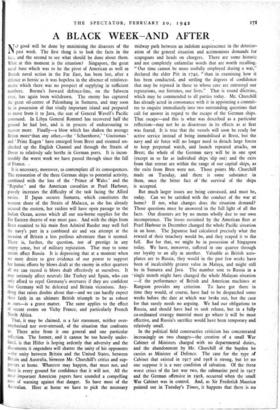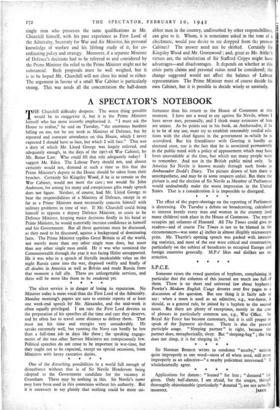A BLACK WEEK-AND AFTER
NO good will be done by minimising the disasters of the past week. The first thing is to look the facts in the face, and the second to see what should be done about them. What at this moment is the situation? Singapore, the great naval base which was to be the pivot of American as well as British naval action in the Far East, has been lost, after a defence as heroic as it was hopeless in the absence of reinforce- ments which there was no prospect of supplying in sufficient numbers. Burma's forward defence-line, on the Salween river, has again been withdrawn. The enemy has captured the great oil-centre of Palembang in Sumatra, and may soon be in possession of that vitally important island and prepared to move from it to Java, the seat of General Wavell's Pacific command. In Libya General Rommel has recovered half the ground he had lost, and is in process of endeavouring to recover more. Finally—a blow which has shaken the average Briton morethan any other,—the Scharnhorst," Gneisenae and ' Prinz Eugen ' have emerged from Brest and steamed un- checked up the English Channel and through the Straits of Dover to relatively safe berths in German ports. It is incon- testably the worst week we have passed through since the fall of France. ...
It is necessary, moreover, to contemplate all its consequences. The restoration of the three German ships to potential activity, combined with the loss of the Prince of Wales' and the Repulse ' and the American casualties at Pearl Harbour, gravely increases the difficulty of the task facing the Allied navies. If. Japan secures Sumatra, which constitutes the western shore of the Straits of Malacca, as she has already secured the eastern, her raiders will have open passage to the Indian Ocean, across which all our sea-borne supplies for the Far Eastern theatre of war must pass. And with the ships from Brest reunited to his main fleet Admiral Raeder may well feel the navy's part in a combined air and sea attempt at the invasion of Britain a less perilous adventure than it seemed. There is, further, the question, not of prestige in any empty sense, but of military reputation. That may to some extent affect Russia. It is depressing that at a moment when we most desire to give evidence of our power to support her heroic efforts by blows dealt at the enemy in other quarters all we can record is blows dealt effectively at ourselves. It may seriously affect neutrals like Turkey and Spain, who can only afford to repel Germany's overtures if they are confident that Germany will be defeated and Britain victorious: Any- thing that raises doubts about that—and we can hardly expect their faith in an ultimate British triumph to be as robust as ours—is a grave matter. The same applies to the effect of recent events on Vichy France, and particularly French North Africa.
That, it may be claimed, is a fair statement, neither over- emphasised nor over-stressed, of the situation that confronts 0. There arise from it one general and one particular reflection. The former, and it cannot be too heavily under- lined, is that Hitler is hoping ardently that adversity and the discontents it engenders will shatter the unity of his opponents —the unity between Britain and the United States, between Britain and Australia, between Mr. Churchill's critics and sup- porters at home. Whatever may happen, that must not, and there is every ground for confidence that it will not. All the most important American papeis have sounded a compelling note of warning against that danger. So have most of the Australian. Here at home we have to pick the necessary midway path between an indolent acquiescence in the deterior- ation of the general situation and acrimonious demands for scapegoats and heads on chargers. There are some historic and not completely unfamiliar words that are worth recalling. " Our time cannot be more usefully employed during a war," declared the elder Pitt in 174o, " than in examining how it has been conducted, and settling the degrees of confidence that may be reposed in those to whose care are entrusted our reputations, our fortunes, our lives." That is sound doctrine, which may be commended to all parties today. , Mr. Churchill has already acted in consonance with it in appointing a commit- tee to enquire immediately into two outstanding questions that call for answer in regard to the escape of the German ships. That escape—and this is what was described as a particular reflection—may not be as disastrous in its effects as at first was feared. It is true that the vessels will soon be ready for active service instead of being immobilised at Brest, but the navy and air force will no longer need to detach large forces to keep perpetual watch, and launch repeated attacks, on Brest; the whole of the German navy will be in one spot (except in so far as individual ships -slip out) and the exits from that retreat are within the range of our capital ships, as the exits from Brest were not. Those points Mr. Churchill made on Tuesday, and there is some substance in them, once the bitter fact of ' the survival of the ships is accepted.
But much larger issues are being canvassed, and must be, today. Can we be satisfied with the conduct of the war at home? If not, what changes does the situation demand? Those questions must be answered in the full light of all the facts. Our disasters are by no means wholly due to our own incompetence. The losses sustained by the American fleet at Pearl Harbour in December changed the whole Pacific situation in an hour. The Japanese had calculated precisely what the reward of their treachery would be, and they reaped it to the full. But for that, we might be in possession of Singapore today. We have, moreover, suffered in one quarter through our loyalty to an ally in another. Valuable as British aero- planes are to Russia, they would in the past few weeks have been of incalculably greater value in Malaya, and might still be in Sumatra and Java. The number sent to Russia in a 'single month might have changed the whole Malayan situation —if the performance of British and American machines at Rangoon provides any criterion. To have got there in time they would, of course, have had to be despatched some weeks before the date at which war broke out, but the case for that surely needs no arguing. We had our obligations to Russia, and should have had to seek release, but in a fully co-ordinated strategy material must go where it will be most effective, and Russia's sacrifice would have been temporary and relatively small.
In the political field constructive criticism has concentrated increasingly on two changes—the creation of a small War Cabinet of Ministers charged with no departmental duties, and the abandonment by Mr. Churchill of the burden he carries as Minister of Defence. The case for the type of Cabinet that existed in 1917 and 1918 is strong, but let no one suppose it is a sure condition of salvation. Of the three worst crises of the last war two, the submarine peril in 1917 and the German offensive in 1918, occurred when the small War Cabinet was in controL And, as Sir Frederick Maurice pointid out in Tuesday's Times, it happens that there is no single man who possesses the same qualifications as Mr. Churchill himself, with his past experience as First Lord of the Admiralty, Secretaly for War and Air Minister, his personal knowledge of warfare and his lifelong study of it, for co- ordinating policy and strategy. Moreover, if a separate Minister of Defence's decisions had to be referred to and considered by the Prime Minister the relief to the Prime Minister might not be substantial. Both proposals must be well weighed, but it is to be hoped Mr. Churchill will not close his mind to either. The argument in favour of a small War Cabinet is particularly strong. This war needs all the concentration the half-dozen ablest men in the country, undisturbed by other responsibilities, can give to it. Whom, it is sometimes asked in the tone of a checkmate, would you desire to see dropped from th.: present Cabinet? The answer need not be shirked. Certainly Sir Kingsley Wood and Mr. Greenwood ; and, great as Mr. Attlee's virtues are, the substitution of Sir Staffcrd Cripps might have advantages—and disadvantages. It depends on whether at this crisis party claims and personal status need be considered; the change suggested would not affect the balance of Labour representation. The Prime Minister must of course decide his own Cabinet, but it is possible to decide wisely or unwisely.



























 Previous page
Previous page